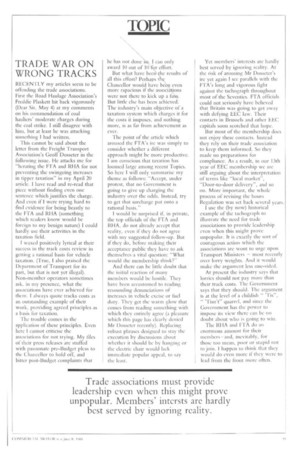TRADE WAR ON WRONG TRACKS
Page 41

If you've noticed an error in this article please click here to report it so we can fix it.
RECENTLY my articles seem to be offending the trade associations. First the Road Haulage Association's Freddie Plaskett hit back vigorously (Dear Sir, May 4) at my comments on his commendation of coal hauliers' moderate charges during the coal strike. I still disagree with him, but at least he was attacking something I had written.
This cannot be said about the letter from thc Freight Transport Association's Geoff Dosseter in the following issue. He attacks me for "berating the FTA. and RHA for not preventing the swingeing increases in tipper taxation" in my April 20 article. I have read and re-read that piece without finding even one sentence which justifies the charge. And even if I were trying hard to find evidence for being beastly to the FTA and RHA (something which readers know would be foreign to my benign nature) I could hardly use their activities in the taxation field.
I waxed positively lyrical at their success in the track costs review in getting a rational basis for vehicle taxation. (True, I also praised the Department of Transport for its part, but that is not yet illegal). Non-member operators sometimes ask, in my presence, what the associations have ever achieved for them, I always quote tracks costs as an outstanding example of their work, providing agreed principles as a basis for taxation.
The trouble comes in the application of these principles. Even here I cannot criticise the associations for not trying. My files of their press releases are stuffed with passionate pre-Budget pleas to the Chancellor to hold off, and bitter post-Budget complaints that he has not done s I can only award 10 out of 10'f r effort.
But what have been he results of all this effort? Perhaps t Chancellor would have be even more rapacious if the associ ons were not there to kick up a firss. But little else has been achieved The industry's main objective of a taxation system which charges it for the costs it imposes, and nothing more, is as far from achievement as ever.
The point of the article which aroused the FTA's ire was simply to consider whether a different approach might be more productive. I am conscious that taxation has loomed large among recent Topics. So here I will only summarise my theme as follows: "Accept, under protest, that no Government is going to give up charging the industry over the odds. Instead, try to get that surcharge put onto a rational basis."
I would be surprised if, in private, the top officials of the FTA and RHA, do not already accept that reality, even if they do not agree with my suggested follow-up. But if they do, before making their acceptance public they have to ask themselves .a vital question: "What would the membership think?"
And there can be little doubt that the initial reaction of many members would be hostile. They have been accustomed to reading resounding denunciations of increases in vehicle excise or fuel duty. They get the warm glow that comes from reading something with which they entirely agree (a pleasure which this page has clearly denied Mr Dosseter recently). Replacing robust phrases designed to stay the execution by discussions about whether it should be by hanging or the electric chair would lack immediate popular appeal, to say the least. Yet members' interests are hardly best served by ignoring reality. At the risk of arousing Mr Dosseter's ire yet again I see parallels with the FTA's long and vigorous fight . against the tachograph throughout most of the Seventies. FTA officials could not seriously have believed that 13ritain was going to get away with defying EEC law. Their contacts in Brussels and other EEC capitals soon scotched that hope.
But most of the membership does not enjoy these contacts. Instead they rely on their trade association to keep them informed. So they made no preparations for compliance. As a result, in our 13th year of EEC membership we arc still arguing about the interpretation of terms like "local market", "Door-to-door delivery", and so on. More important, the whole process of revising the hours Regulation was set back several years. I use the (by now) historical example of the tachograph to illustrate the need for trade associations to provide leadership even when this might prove unpopular. It is exactly the sort of courageous action which the associations are wont to urge upon Transport Ministers — most recently over lorry weights. And it would make the argument less one-sided.
At present the industry says that lorries should not pay more than their track costs. The Government says that they should. The argument is at the level of a childish " 'Tis", " 'Tisn't" quarrel, and since the Government has the power to impose its view there can be no doubt about who is going to win.
The RHA and FTA do an enormous amount for their members—and, inevitably, for those too mean, poor or stupid not to join. I happen to think that they would do even more if they were to lead from the from more often.




































































































